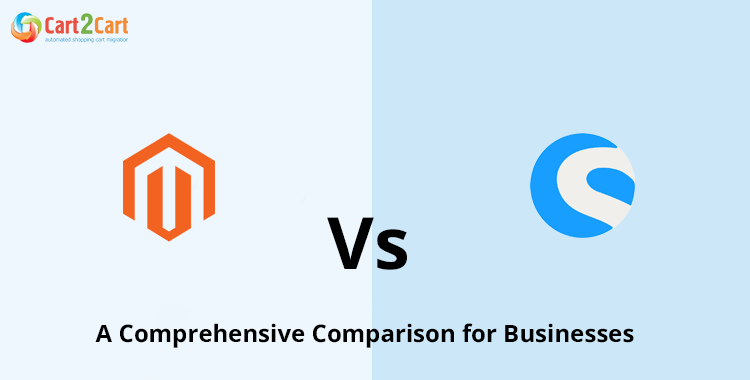 When it comes to building and growing an online business, choosing the right e-commerce platform is essential. Among the many options available today, two of the most talked-about names are Magento and Shopware. These platforms cater to different types of businesses and have their own unique strengths. This detailed comparison will help you understand the key differences, pros and cons, and features of Magento vs Shopware, allowing you to make an informed decision on which platform is right for your e-commerce needs.
When it comes to building and growing an online business, choosing the right e-commerce platform is essential. Among the many options available today, two of the most talked-about names are Magento and Shopware. These platforms cater to different types of businesses and have their own unique strengths. This detailed comparison will help you understand the key differences, pros and cons, and features of Magento vs Shopware, allowing you to make an informed decision on which platform is right for your e-commerce needs.
Key Features of Magento and Shopware
Both platforms are feature-rich, with a variety of options to help businesses grow and streamline their online sales processes. Here’s an overview of the key features that set Magento vs Shopware apart.Magento Features
- Open-source Flexibility: Magento is known for being an open-source platform, which means you have complete control over customization and functionality. It allows you to tailor the platform to your specific business needs.
- Scalability: Whether you are a small startup or a large enterprise, Magento offers scalability, which makes it a great choice for growing businesses.
- SEO Capabilities: Magento comes with built-in tools and functionalities that help optimize your store for search engines, which is a vital aspect of driving organic traffic.
- Extensive Marketplace: With thousands of extensions and plugins available, Magento allows businesses to expand their functionality with ease. From marketing to payment processing, the variety of extensions is vast.
Shopware Features
- User-friendly Interface: Shopware stands out for its easy-to-use interface, making it suitable for beginners and businesses that don't want to rely heavily on developers.
- Content Management: Shopware is designed with content management in mind, providing rich content creation tools such as blogs, articles, and videos.
- Customizable Design: With a selection of templates and customizable themes, Shopware lets you design your online store to suit your brand's look and feel.
- Advanced SEO Features: Shopware comes equipped with a set of SEO tools and features to ensure your products rank higher in search results.

Magento vs Shopware: Performance Comparison
Performance is a critical factor when selecting an e-commerce platform, especially when your website starts to handle larger amounts of traffic. Let’s dive into how Magento vs Shopware performs in terms of speed, scalability, and overall user experience.| Criteria | Magento | Shopware |
| Speed | Magento requires optimization for best performance | Shopware is fast out-of-the-box, offering great performance |
| Scalability | Highly scalable for large enterprises, can handle extensive product catalogs | Scalable for SMBs, not as heavy-duty as Magento for large-scale enterprises |
| Hosting Options | On-premise hosting, cloud hosting (Magento Commerce) | Primarily cloud-based hosting with optional on-premise hosting |
| Performance Out of Box | Slower without optimization due to complex features | Faster by default, but can be expanded as needed |
Ease of Use and Customization
Magento is incredibly powerful, but it is not the most user-friendly option for beginners. Its complexity can make it difficult to manage without a team of developers or significant technical expertise. While it offers incredible customization options, it comes at the cost of ease of use.Magento Customization
- Code-Level Customization: With Magento, businesses can create highly customized solutions by modifying the core code.
- Flexible Theme Options: You can create a unique design that aligns with your branding, but you may need technical expertise to do so.
- Extension Support: There are numerous extensions available for Magento, allowing for enhanced functionality in areas like payments, marketing, and security.
Shopware Customization
- Theme Customization: Shopware also offers flexible theme options but makes it easier for businesses to implement design changes without much technical knowledge.
- Built-in Content Management: One of Shopware’s key strengths is the ease with which you can manage content such as images, blogs, and landing pages, all within its intuitive admin panel.
- No-Code and Low-Code Tools: Shopware provides tools that allow non-developers to create advanced store features, making it a great choice for businesses with limited coding skills.
Pricing and Cost Analysis
When it comes to cost, the Magento vs Shopware debate tends to focus on the initial setup costs, ongoing maintenance, and scalability.Magento Pricing
- Magento Open Source: Free to use, but you will still need to pay for hosting, development, security, and extensions.
- Magento Commerce: The enterprise version is subscription-based, and pricing starts at around $22,000 per year. This can go up depending on the scale of your business and the customizations required.
- Additional Costs: Hosting, third-party apps, and developer fees can add up quickly, making it an expensive option for small businesses.
Shopware Pricing
- Shopware Community Edition: Free to use, just like Magento Open Source.
- Shopware Professional and Enterprise: These editions come with additional features, support, and advanced capabilities. Pricing starts around €2,495 per year for the Professional edition.
- Additional Costs: Like Magento, you will need to factor in costs for hosting, extensions, and development, but overall Shopware tends to be less expensive for businesses that don’t need enterprise-level functionality.

Magento vs Shopware: Pros and Cons
Magento Pros
- Highly customizable
- Scalable for enterprises
- Extensive marketplace for extensions
- Strong SEO and marketing tools
Magento Cons
- Expensive setup and ongoing costs
- Complex to set up and maintain
- Requires technical expertise
- Not as beginner-friendly
Shopware Pros
- User-friendly and intuitive
- Fast and easy to set up
- Ideal for small to medium-sized businesses
- Affordable pricing and transparent cost structure
Shopware Cons
- Less customizable than Magento
- Limited support for large enterprises
- Smaller community and fewer integrations compared to Magento


